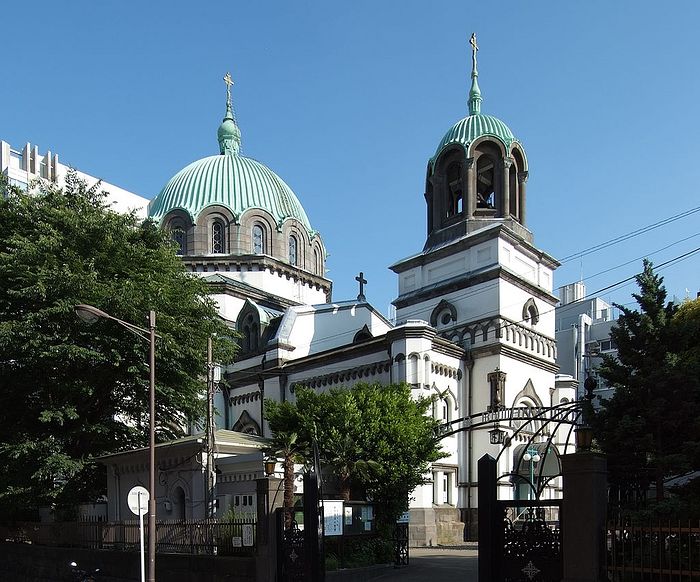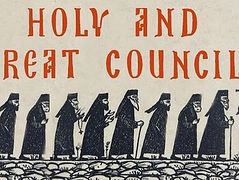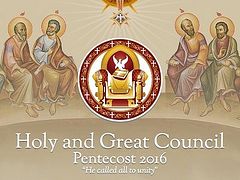Source: Holy and Great Council
June 26, 2016
The Holy and Great Council of the Orthodox Church concerned itself with the matter of Autonomy and the Means by Which it is Proclaimed. Therefore, the respective document, which was submitted by the Fifth Pre-Conciliar Pan-Orthodox Conference (Chambésy, October 10-17, 2009) was discussed and was approved with some minor amendments as follows:
The questions of the text examined by the Council addressed: a) the concept, nature, and various forms of the institution of autonomy; b) the prerequisites for a local Church to request autonomy from the autocephalous Church to which it belongs; c) the exclusive prerogative of an autocephalous Church to initiate and complete the process of granting autonomy to a certain segment of its canonical jurisdiction – autonomous Churches shall not be established in the geographical areas of the Orthodox Diaspora; d) the impact of this ecclesial act on the relations between the proclaimed autonomous Church and with the autocephalous Church to which it belongs as well as with the other autocephalous Orthodox Churches.
- The institution of autonomy is a canonical expression of the relative or partial independence of a particular ecclesial region from the canonical jurisdiction of the autocephalous Church to which it canonically belongs.
- The implementation of this institution through ecclesial praxis has given rise to various degrees of dependence with respect to the relationship of the autonomous Church to the autocephalous Church to which it canonically refers.
- The election of the Primate (First Hierarch) of an autonomous Church is approved or executed by the appropriate ecclesiastical entity of the autocephalous Church. The Primate of the autonomous Church commemorates and is canonically related to the primate of the autocephalous Church.
- In the application of the institution of autonomy, we find various forms of its implementation in ecclesial praxis defined by the degree of dependence of the autonomous Church on the autocephalous Church.
- In some forms of autonomy, the degree of dependence of an autonomous Church is also expressed through the participation of its primate in the Synod of the autocephalous Church.
- The initiation and completion of the process for granting autonomy to a region within the canonical jurisdiction of an autocephalous Church is the canonical prerogative of the autocephalous Church. The Church proclaimed autonomous refers to the autocephalous Church. Accordingly:
- A local Church that requests autonomy, after showing that it has fulfilled all necessary ecclesial, canonical and pastoral prerequisites, may submit its application to the autocephalous Church to which it has its reference, explaining the serious reasons prompting such a request.
- Upon receiving the application, the autocephalous Church considers, in Synod, all of the prerequisites and reasons for the submission, and decides whether or not to grant autonomy. In the event of a favorable decision, the autocephalous Church issues a Tomos, which defines the geographical boundaries of the autonomous Church and its relationship with the autocephalous Church to which it refers, in accordance with the established criteria of ecclesial Tradition.
- The primate of the autocephalous Church informs the Ecumenical Patriarchate and the other autocephalous Orthodox Churches of the proclamation of the autonomous Church.
- The autonomous Church realizes its inter-Orthodox, inter-Christian, and inter-religious relations through the autocephalous Church from which it received autonomy.
- Each autocephalous Church may only grant autonomy within the borders of its canonical geographical region. Autonomous Churches are not established in the region of the Orthodox Diaspora, except by pan-Orthodox consensus, upheld by the Ecumenical Patriarch in accordance with prevailing pan-Orthodox practice.
- In the event that two autocephalous Churches grant autonomous status within the same geographical ecclesial region, prompting contestation over the status of each autonomous Church, the parties involved appeal—together or separately—to the Ecumenical Patriarch so that he may find a canonical solution to the matter in accordance with prevailing pan-Orthodox practice.
- The Primate of the autonomous Church only commemorates the name of the primate of the autocephalous Church.
- The name of the Primate of the autonomous Church is not entered into the Diptychs.
- The autonomous Church receives holy chrism from the autocephalous Church.
- The bishops of the autonomous Church are elected, appointed and judged by its own appropriate ecclesiastical organ. In the event that the autonomous Church finds this absolutely impossible, it receives assistance from the autocephalous Church to which it refers.
- The implications for the autonomous Church with respect to its relationship to the autocephalous Church, following its proclamation of autonomy, are as follows:
† Bartholomew of Constantinople, Chairman
† Theodoros of Alexandria
† Theophilos of Jerusalem
† Irinej of Serbia
†Daniel of Romania
† Chrysostomos of Cyprus
† Ieronymos of Athens and All Greece
† Sawa of Warsaw and All Poland
† Anastasios of Tirana, Durres and All Albania
† Rastislav of Presov, the Czech Lands and Slovakia
Delegation of the Ecumenical Patriarchate
† Leo of Karelia and All Finland
† Stephanos of Tallinn and All Estonia
† Elder Metropolitan John of Pergamon
† Elder Archbishop Demetrios of America
† Augustinos of Germany
† Irenaios of Crete
† Isaiah of Denver
† Alexios of Atlanta
† Iakovos of the Princes’ Islands
† Joseph of Proikonnisos
† Meliton of Philadelphia
† Emmanuel of France
† Nikitas of the Dardanelles
† Nicholas of Detroit
† Gerasimos of San Francisco
† Amphilochios of Kisamos and Selinos
† Amvrosios of Korea
† Maximos of Selyvria
† Amphilochios of Adrianopolis
† Kallistos of Diokleia
† Antony of Hierapolis, Head of the Ukrainian Orthodox in the USA
† Job of Telmessos
† Jean of Charioupolis, Head of the Patriarchal Exarchate for Orthodox Parishes of the Russian Tradition in Western Europe
† Gregory of Nyssa, Head of the Carpatho-Russian Orthodox in the USA
Delegation of the Patriarchate of Alexandria
† Gabriel of Leontopolis
† Makarios of Nairobi
† Jonah of Kampala
† Seraphim of Zimbabwe and Angola
† Alexandros of Nigeria
† Theophylaktos of Tripoli
† Sergios of Good Hope
† Athanasios of Cyrene
† Alexios of Carthage
† Ieronymos of Mwanza
† George of Guinea
† Nicholas of Hermopolis
† Dimitrios of Irinopolis
† Damaskinos of Johannesburg and Pretoria
† Narkissos of Accra
† Emmanouel of Ptolemaidos
† Gregorios of Cameroon
† Nicodemos of Memphis
† Meletios of Katanga
† Panteleimon of Brazzaville and Gabon
† Innokentios of Burudi and Rwanda
† Crysostomos of Mozambique
† Neofytos of Nyeri and Mount Kenya
Delegation of the Patriarchate of Jerusalem
† Benedict of Philadelphia
† Aristarchos of Constantine
† Theophylaktos of Jordan
† Nektarios of Anthidon
† Philoumenos of Pella
Delegation of the Church of Serbia
† Jovan of Ohrid and Skopje
† Amfilohije of Montenegro and the Littoral
† Porfirije of Zagreb and Ljubljana
† Vasilije of Sirmium
† Lukijan of Budim
† Longin of Nova Gracanica
† Irinej of Backa
† Hrizostom of Zvornik and Tuzla
† Justin of Zica
† Pahomije of Vranje
† Jovan of Sumadija
† Ignatije of Branicevo
† Fotije of Dalmatia
† Athanasios of Bihac and Petrovac
† Joanikije of Niksic and Budimlje
† Grigorije of Zahumlje and Hercegovina
† Milutin of Valjevo
† Maksim in Western America
† Irinej in Australia and New Zealand
† David of Krusevac
† Jovan of Slavonija
† Andrej in Austria and Switzerland
† Sergije of Frankfurt and in Germany
† Ilarion of Timok
Delegation of the Church of Romania
† Teofan of Iasi, Moldova and Bucovina
† Laurentiu of Sibiu and Transylvania
† Andrei of Vad, Feleac, Cluj, Alba, Crisana and Maramures
† Irineu of Craiova and Oltenia
† Ioan of Timisoara and Banat
† Iosif in Western and Southern Europe
† Serafim in Germany and Central Europe
† Nifon of Targoviste
† Irineu of Alba Iulia
† Ioachim of Roman and Bacau
† Casian of Lower Danube
† Timotei of Arad
† Nicolae in America
† Sofronie of Oradea
† Nicodim of Strehaia and Severin
† Visarion of Tulcea
† Petroniu of Salaj
† Siluan in Hungary
† Siluan in Italy
† Timotei in Spain and Portugal
† Macarie in Northern Europe
† Varlaam Ploiesteanul, Assistant Bishop to the Patriarch
† Emilian Lovisteanul, Assistant Bishop to the Archdiocese of Ramnic
† Ioan Casian of Vicina, Assistant Bishop to the Romanian Orthodox Archdiocese of the Americas
Delegation of the Church of Cyprus
† Georgios of Paphos
† Chrysostomos of Kition
† Chrysostomos of Kyrenia
† Athanasios of Limassol
† Neophytos of Morphou
† Vasileios of Constantia and Ammochostos
† Nikiphoros of Kykkos and Tillyria
† Isaias of Tamassos and Oreini
† Barnabas of Tremithousa and Lefkara
† Christophoros of Karpasion
† Nektarios of Arsinoe
† Nikolaos of Amathus
† Epiphanios of Ledra
† Leontios of Chytron
† Porphyrios of Neapolis
† Gregory of Mesaoria
Delegation of the Church of Greece
† Prokopios of Philippi, Neapolis and Thassos
† Chrysostomos of Peristerion
† Germanos of Eleia
† Alexandros of Mantineia and Kynouria
† Ignatios of Arta
† Damaskinos of Didymoteixon, Orestias and Soufli
† Alexios of Nikaia
† Hierotheos of Nafpaktos and Aghios Vlasios
† Eusebios of Samos and Ikaria
† Seraphim of Kastoria
† Ignatios of Demetrias and Almyros
† Nicodemos of Kassandreia
† Ephraim of Hydra, Spetses and Aegina
† Theologos of Serres and Nigrita
† Makarios of Sidirokastron
† Anthimos of Alexandroupolis
† Barnabas of Neapolis and Stavroupolis
† Chrysostomos of Messenia
† Athenagoras of Ilion, Acharnon and Petroupoli
† Ioannis of Lagkada, Litis and Rentinis
† Gabriel of New Ionia and Philadelphia
† Chrysostomos of Nikopolis and Preveza
† Theoklitos of Ierissos, Mount Athos and Ardameri
Delegation of the Church of Poland
† Simon of Lodz and Poznan
† Abel of Lublin and Chelm
† Jacob of Bialystok and Gdansk
† George of Siemiatycze
† Paisios of Gorlice
Delegation of the Church of Albania
† Joan of Koritsa
† Demetrios of Argyrokastron
† Nikolla of Apollonia and Fier
† Andon of Elbasan
† Nathaniel of Amantia
† Asti of Bylis
Delegation of the Church of the Czech lands and Slovakia
† Michal of Prague
† Isaiah of Sumperk





